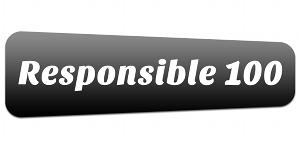
By Michael Solomon
For more than 12 years, my colleagues at Responsible 100 and I have been obsessed with the idea of being able to identify – and thus support and reward – genuinely responsible businesses.
If people can easily and assuredly identify and support such businesses, then, as consumers, employees, suppliers, investors et al, we are confident that a large proportion of people will do just that. And, if this is the case, then responsibility can drive profitability.
Profit-seeking shapes business, and thus the world around us, like nothing else. When responsible practices are adopted to increase profit, business’ huge potential to make the world a better place can be realized.
Having worked with the widest variety of businesses and collaborators, as well as supporters from the NGO, campaign group and not-for-profit worlds, and having conducted extensive research, experimentation and prototyping, we believe that we are close to a formulation for what makes a world-changing, responsible business. Further, we believe this is something that any business may adopt if it so chose to.
There are eight key ideas set out below. We are now seeking feedback. Please share your views with us and/or publicly by commenting on this article.
Our business, Profit Through Ethics Ltd, created and is busy developing the Responsible 100 movement. What our business and the other 30 or so now part of Responsible 100 have in common, in my view, are the following beliefs and attributes:
1. This is our fight
The challenges are huge: the lack of public trust in business; the barriers to social and environmental sustainability. They are not necessarily all our fault, but they certainly are all our problem. Action is needed. We seek to be the best organization we can be ourselves and to effect positive change on the world around us in the process. It is within our power to help create and be part of a better business; we will exercise that power.
2. We will prove it
Responsibility is not a game or a PR exercise. In this, we will leave no room for doubt as to where our business stands. Claiming to be responsible but not providing proof perpetuates ‘business as usual’. Words alone do not suffice. We are willing and able to prove our commitment to responsible business practices.
3. Open and honest on everything
We do not insist on defining responsibility on our own terms. We are not selective as to which responsibility issues are on or off limits. We are prepared to be transparent and accountable in respect of everything we do.
4. Mapping performance
We are committed to mapping our performance on all material social, environmental and ethical issues -- determining how we compare to other businesses, and how and where we can improve our practices.
5. As (net) positive as possible
We are committed to maximizing our positive impacts on society and the environment and minimizing our negative impacts, as quickly and as widely as possible, across our operations.
6. Real dialogue
We are willing to publicly explain and justify the decisions we make and the things we do. We welcome dialogue with any stakeholder group – even members of the public who simply have a view – and invite them into business decision-making processes where possible.
7. Legitimate profits
We are prepared to avoid or withdraw from markets for services and products where avoidable harm occurs to people or to the environment. We will challenge ourselves, and others, to do this as rapidly as possible.
8. Balancing profit and society
We are actively and deliberately balancing our pursuit of profit with the best interests of society to the fullest possible extent.
--
Responsible 100 is working to enable businesses which are aligned with the above to differentiate themselves from those which are not.
We believe businesses prepared to accord with these eight attributes will soon find themselves able to compete on price, quality and their success in helping people live better lives in a better world. We believe they will restore public trust in business.
We also believe that, together, we can shift the economic paradigm. That we can tilt the playing field in our favor by forcing laggard businesses to play catch-up. Not because they are finally persuaded of some moral argument to be ethical, responsible or sustainable, but because remaining profitable will demand it.
Business as a force for good? It may be nearer at hand than you dare imagine.
Image credit: Responsible 100 via Facebook
Michael Solomon is the founder of Responsible 100 which combines a management tool, a business performance ranking, an internet platform and a growing social movement. He firmly believes that market mechanisms can be harnessed to enable responsibility to drive profitability.
Please provide your feedback on these eight suggested attributes by commenting here, below the article on the Triple Pundit website, or by contacting Responsible 100 directly.
TriplePundit has published articles from over 1000 contributors. If you'd like to be a guest author, please get in touch!














